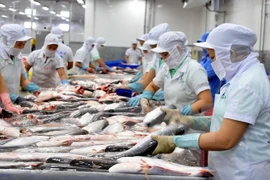 Herb Cochran, senior director of Trade Facilitation and Special Projects of AmCham Vietnam in HCM City, speaks with media on the sidelines of a seminar on food safety regulations (Source: VNA)
Herb Cochran, senior director of Trade Facilitation and Special Projects of AmCham Vietnam in HCM City, speaks with media on the sidelines of a seminar on food safety regulations (Source: VNA)HCM City (VNA) - Vietnamese enterprises should strive to meet strict foodsafety requirements from importing countries, especially choosy markets like theUS, Japan, the Republic of Korea, and the European Union (EU), participants said at an international seminarheld in Ho Chi Minh City on April 3.
It is now time to comply with new regulations as food-safety regulation non-compliance is the largest barrier to entry forVietnamese firms, said Herb Cochran, senior director of Trade Facilitation andSpecial Projects at AmCham Vietnam in HCM City.
To integrate into the global market, Vietnamesebusinesses must learn more about regulations and improve quality to meet thesenew standards, he said.
Vu Kim Hanh, Chairwoman of the High QualityVietnamese Goods Business Association, said that even though Vietnam hadintegrated deeply into the global economy, local enterprises still lackedknowledge about the US’s Food Safety Modernization Act (FMSA) and European FoodSafety Authority regulations.
Ensuring food safety and hygiene will open upmany opportunities for businesses at home as well as strict markets like theUS, the EU, and Japan, she said.
Given that most countries are strengtheningprotection barriers, Vietnamese products will have access to huge markets ifthey meet international standards and regulations, Hanh added.
Vietnamese Minister of Science andTechnology Chu Ngọc Anh said that Vietnamese High-Quality Good International Standards forthe food industry had been issued by the High Quality Vietnamese Goods BusinessAssociation. It’s necessary to promulgate this set ofstandards as it provides food companies with a clear direction in developingtheir products and gives consumers a guide to identify trusted and quality foodproducts, he said.
Other experts at the seminar spoke about theFSMA, geographical indication certificates, and the use of high technologyfor food safety. Food safety regulations under FSMA have becomestricter, with more inspections and higher standards, causing difficulties forVietnamese exports, especially since June 2016 when the law took effect,experts warned.
Other countries to which Vietnam exports,including Canada, the EU and Australia, are expected to have a similar law.
According to Dr. Delphine Marie Vivien, of the InnovationResearch Unit and Malica Research Consortium, consumers were increasinglyconcerned about how their food was produced. The origin of food is very important forconsumers who value tradition and cultural identity, and who are sensitive tospecific sensorial characteristics of the products. Some consumers are willingto pay more to find such characteristics in the product.
Geographical indication (GI), for example, isused on products that have a specific geographical origin, for example, town,region or country, and possess qualities or a reputation that are attributableto that origin, she said.
Participants at the meeting also called on localcompanies to increase the use of organic farming practices in agriculturalproduction, animal breeding and aquaculture. Organic certification would open the door forVietnamese goods to export to choosy markets like the US, Japan and the EU,according to Hanh of the High Quality Vietnamese Goods Business Association.
The seminar was organised by the Vietnamese HighQuality Product Business Association in collaboration of the Food SafetyManagement Board of HCM City, on the sidelines of theVietnamese High-Quality Products Fair, which opened at Phu ThoStadium in HCM City’s District 11 on the same day.-VNA




























